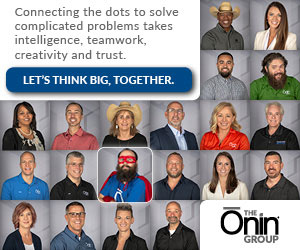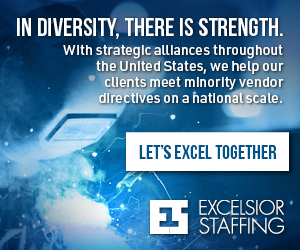Diversity isn’t a new buzzword. The concept has long been on the lips of college professors, and if you’ve logged onto LinkedIn within the past five years, you had probably noticed “diversity” was one of the hottest terms. But the concept of diversity really burst into mainstream consciousness with the deaths of George Floyd and Breonna Taylor in 2020.
The recent events in the United States have brought to light some issues that have long needed to be addressed, and I feel like I’m in a unique position to speak to a small, but important, aspect of this situation.
I’m the president and majority owner of Excelsior Staffing, a minority business enterprise (MBE), which provides a wide range of services dealing with contingent labor and direct hire placement. If you see me around, I’m probably wearing a cowboy hat. I have a bachelor’s of arts in communications and a masters of Biblical studies. After a college football career and a short stint with the NFL, I began a career in sales and marketing that has spanned more than two decades. I’m a professional, an entrepreneur, a sports fan, an author, a Christian — and a black man.
In the wake of 2020’s events, I’ve seen many companies adopt measures like creating “diversity inquiry boards” and posting pro-diversity statements on social media, but I’ve seen few moves to actually diversify opportunities. While companies who adopt these soft measures are undoubtedly well-meaning, these gestures do little to truly diversify opportunities for minorities.
As business leaders, there is something practical and tangible we can do to address diversity. What I’m talking about is a move to accountability in creating a diversified workforce and providing actual support of minority-owned businesses.
I believe reassessing vendors is a meaningful part of creating a fairer business environment that gives quality vendors a chance to rise to the occasion and creates new value for companies. And of course, evaluating how those vendors treat their diverse workforces is a key part of the deal.
For years, long before 2020, I have met companies with diversity programs and plans, but the actual dollars they spent on certified MBE companies was very small. Most companies already had relationships with non-minority vendors. There’s nothing wrong with that, and I’m a big supporter of strong business relationships. However, if your company is serious about spending more of its dollars with minority-owned businesses, you can support minority businesses and improve your support of the contingent workforce.
Right now is the perfect time to make a change and support minorities in a meaningful way. If you’re finally ready to take the plunge, there are two more qualities in your MBE supplier you need to consider.
The Problem with MBE Suppliers
Most companies don’t take the time to reassess their supplier choices, but for companies that are open to working with minority suppliers, there’s a real, and valid, reason to worry about partnering with MBE suppliers: cash flow. This is especially true in the staffing industry.
The economy is not (and never will be) stable. As companies seek to ride the ups and downs of boom-times and deep recessions, they need supplier partners who can support them through it all.
As we’ve seen in the staffing industry, choosing suppliers that are unable to weather a financial crisis often has poor outcomes for client companies and workers alike. When a supplier closes their doors, there is often little time to create an exit strategy, which leaves the client managing their teams in crisis mode. A lack of funds can also result in missed worker’s comp insurance payments, missed paychecks, and other issues that ultimately leave client employers open to lawsuits.
Luckily, the solution to finding financially capable suppliers is simple: Ask potential suppliers about their cash flow situation. If the vendor is financially solid, they will be more than happy to tell you how and why their financial foundation is strong.
At the end of the day, you don’t have to sacrifice the quality of service or your peace of mind if you choose a minority-owned vendor for your needs. And when you choose a minority-owned vendor, you have the additional peace of mind knowing you have taken meaningful action to address racial opportunity disparities. That is, as long as you have addressed the quality of opportunity your supplier is giving your workers.
Creating Opportunities for Minority Workers
Even if you select a solid and stable minority vendor, you want to make sure that the vendor is spreading the opportunity you gave them to their workforce. After all, supporting one person’s business won’t help a vulnerable community as a whole. This is especially true in the staffing industry, where employees often have fewer benefits and more precarious terms of employment.
To make sure supporting the supplier’s business will create change, start by asking questions about their workforce objectives, such as:
- Is the supplier’s workforce diverse?
- What kind of benefits does the supplier provide their workers? Is it a wide range of benefits? And more importantly, are the benefits affordable for workers?
- What is the supplier’s reputation in the job market? Are they worth tying your brand to?
- Does the supplier do any outreach to extend opportunities to new groups of people (such as students and immigrant groups)?
- What does the supplier stand for, and are they doing a decent job of making that happen in the world?
If the supplier has strong answers to this basic list of questions, they are most likely committed to presenting real opportunities and benefits to diverse communities of workers.
Becoming Stronger than Ever
Change is here. After years of stalled diversity spending, 2020 has taught us the time to make a new move is now.
America is more diverse than ever. Regardless of our philosophical or political leanings, America, its economy, and its culture are changing, as they always have. We must adapt to these changes if we want to continue to win as businesses, create opportunity for others, and build stronger communities. Having suppliers and a workforce that accurately reflect this diversity helps future-proof your company.
As business leaders, we want our workplaces to be fair. We all want to foster and help create jobs that are honest opportunities for Americans who are willing to work hard to get ahead in life. It’s not a cliche. We genuinely have the power to make a difference and build a better future for everyone.
When you embrace minority-owned businesses that are willing to do the job, hungry for the opportunity, and have a plan to create a more powerful, diverse workforce — your company will be stronger than ever in a changing world.

Norris Blount
ExcelsiorStaffing.com
Norris Blount is the President, CEO and founder of Excelsior Staffing. Norris received his bachelor’s degree from Baylor University in 1988 and his master’s degree from Covington Theological Seminary in 2005. Over the past 20 years, he has built an impressive resume of experience in sales, staffing and marketing.






